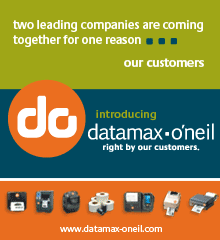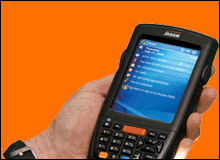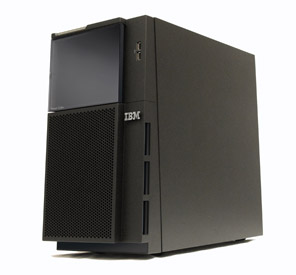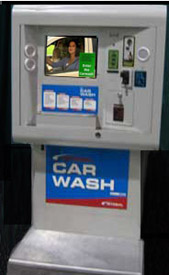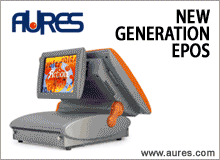
Michael Kachmar, Editor
(If your e-mail client does not display this properly, click here.)
This Week’s Product Pick
CAEN RFID (Staten Island, NY) presented the newest member of its Easy 2 Read product family, the Model A828BT fully integrated UHF RFID/Bluetooth Reader. The A828BT, which is compliant with ISO 18000-6B and ISO 18000-6C/EPC C1G2 standards, can operate either in wired mode, using the USB connection, or in wireless mode through Bluetooth. This Bluetooth capability makes the unit suitable for adding on to PCs, PDAs, BlackBerry devices, and smartphones for proximity UHF readings, according to the vendor, headquartered in Italy. Overall, the new device measures 1.3 in. x 4.3 in. x 1.8 in., and weighs approximately 2.25 ounces. The accompanying pistol grip handle is lightweight and simple to attach. In addition, the two-slot battery charger houses the reader together with an additional battery. Finally, the A828BT is durable, performs extremely well in multiple drop tests to concrete, and enables full working day operation thanks to its long battery life. Commented Giovanni Grieco, Sales and Marketing Director for CAEN RFID, “This new reader is our cost-effective solution that merges two wireless technologies, namely Bluetooth and UHF RFID, aimed to support numerous applications from inventory management, to Point of Sale, to field sales force and more.”
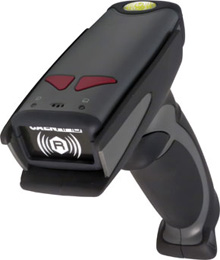
A828BT UHF RFID/Bluetooth Reader from CAEN
COMPANY BUSINESS “No More Manuals,” IBM and Intuit Tell SMB IBM (Armonk, NY) and Intuit (Mountain View, CA) have teamed up to deliver an integrated, automated appliance for the SMB market that promises to simplify technology and business requirements, according to the two parties. The effort combines IBM’s Smart Business solution--including hardware, software, and technical support--with Intuit’s QuickBooks Enterprise Solutions financial management software presented in one nifty device, dubbed Smart Cube. Available for less than $8,000, the appliance addresses many of the fundamental capabilities needed by the SMB market, including e-mail, calendaring, security, and finances. The new solution means clients will no longer require manuals or CDs to install and configure their technology and can count on IBM as their single source of technical support, getting “up and running in four easy steps.” Customers will also have access to remote services such as managed security and hosted data backup and recovery through IBM’s cloud services. In addition to Smart Cube, IBM’s Smart Business framework includes Smart Market, its Web-enabled business and collaboration marketplace, and Smart Desk, its Web-enabled service and maintenance dashboard for clients. The new IBM/Intuit appliance will be sold exclusively through select VARs of the two companies. “Our small and medium business clients are desperate for a simple, easy-to-use solution that will meet their IT requirements,” noted Andrew Abrams, Executive Director and Co-Founder of the Midwestern Intuit VAR, Technology In A Box. “The new IBM/Intuit appliance really is a soup-to-nuts solution for running their business. Even better, Smart Business is the most affordable platform to run QuickBooks Enterprise Solutions. The advantage to our company is that we can help clients migrate from competitive accounting solutions and platforms, providing us with new revenue streams for services and training.”
[Editor’s Note: Intuit also released GoPayment, which lets small business owners utilize their mobile phones to accept credit card payments. As one of its first partners, Intuit will work with Sprint to offer the solution, which targets anyone who sells products or services out of the office, such as carpet cleaners, plumbers, electricians, photographers, and wedding planners.] Radiant Distributes Car Wash Kiosk Radiant Systems (Atlanta) has signed on to distribute Intelio Technologies’ Activa Car Wash Virtual Attendant and to work with Intelio (Irvine, CA) to integrate the kiosk solution with Radiant’s electronic payments software. When the integration has been completed, customers of Radiant and Intelio will be able to accept more than 100 distinct payment cards (in addition to cash) at the Activa Virtual Attendant, depending on network configuration. These include credit, debit, stored value, fleet, and ACH payments. “Car wash is fast becoming a strategic profit center for our customers,” stated Jimmy Frangis, VP of Radiant’s Retail Division. “Integrating electronic payments between the store and the wash is an important first step in innovation at the wash tunnel to provide a differentiated customer experience and to improve retailers’ margins. Under our agreement with Intelio, Radiant will be bringing this innovation to life. Intelio’s Activa kiosk is a natural fit with the rest of Radiant’s store technology and specifically our self-service product line.” Activa Virtual Attendant was designed to “greet, educate, and upsell” car wash customers. Its talking head interface, touchscreen, and stereo sound combine to produce higher average ticket price, according to the manufacturer. Activa works with all major car wash manufacturers and can accept codes sold at fuel dispensers. Intelio supports Activa with its WashMax suite of software tools for back-office car wash operations.
|
Worth
Your While
U Connect Supply Chain Conference
GS1 US
June 2-5
Orlando
HITEC 2009
Hospitality Financial and Technology Professionals
June 22-25
Anaheim, CA
RetailNow 2009
Retail Solutions Providers Association (RSPA)
July 11-16
Las Vegas
VARTECH 2009
BlueStar
August 13-15
Nashville, TN
2009 APICS International Conference & Expo
Association for Operations Management
October 4-6
Toronto
BAI Retail Delivery Conference & Expo
Bank Administration Institute
November 3-5
Boston
Synergy 2009 Customer Conference
Retalix
November 8-11
Dallas
ALL IN THE FAMILY
ATS Hails Maximus Severe Duty
Accu-Time Systems (Ellington, CT) has renamed its NEMA 4X workforce management terminal as the Maximus Severe Duty, following recent IP65 rating approval for dust and water jets. Maximus Severe Duty was developed by ATS to withstand continual exposure to harsh environments and high-pressure wash downs, and has been installed at offshore oil and gas platforms, chemical processing plants, and refining operations. It features its own keypad and may be paired with biometric, barcode, and proximity card readers from ATS to meet unique customer requirements.
ATS also announced that Excel Systems (Taoyuan City, Taiwan) has been appointed as strategic alliance partner and authorized integrator for its two-finger geometry camera in the Asia-Pacific Region. Introduced in 2007, the ATS two-finger camera reads the unique characteristics of any two fingers on the human hand for time and attendance and access control applications. Such finger reading does not carry the legal or cultural concerns of many biometric technologies, according to ATS.
“We have come to respect the talents of Excel and its employees as our relationship has developed over the last few years,” shared Peter DiMaria, Founder and CEO of Accu-Time Systems. “We are delighted to have a partner in the region that is able both to sell and to integrate our technology.” Excel Systems manufactures its own line of terminals for the biometric identification and human capital management (HCM) markets.
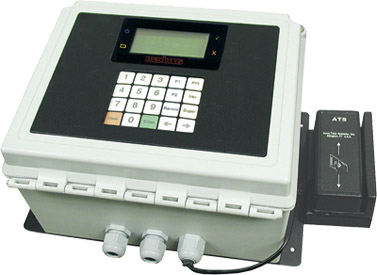
Maximus for Harsh Environments Carries IP65 Rating
Catching Customers with The Cube
GestureTek Inc. (Sunnyvale, CA) has officially launched “The Cube,” the company’s portable, plug-and-play, interactive projection display unit that provides motion-based digital signage for advertising, branding, and promotional campaigns. The Cube measures 23 in. x 18 in. x 16 in., weighs 60 lbs., and includes all electronics. The system employs an accompanying 4 ft. x 5 ft. mat, onto which an 80-inch-diagonal display is projected. Users control and manipulate this multimedia content by stepping onto the projection and triggering GestureTek’s multi-patented video gesture control software.
The Cube targets high-traffic locations in retail and hospitality, as well as trade shows and traveling events. It comes pre-configured and pre-calibrated, and includes over 70 games, special effects, and video and sound presentations. Flash applications are also available. Installation does not require on-site technical support, so The Cube can be moved easily from location to location. Most importantly, it causes passers-by to stop in their tracks and engage with the brand, according to participants in the soft-launch over the past few months.
“We’ve taken the best features of our large, permanent, overhead display deployments and packaged them into this flexible and compact turn-key system that is perfect for even the most space-constrained venues,” declared Vincent John Vincent, President of GestureTek. “A year of research and development has ensured optimal resolution, zero technical support, flexibility to use on both floors and walls, and the ability to allow users to make custom content changes with the press of a button.”
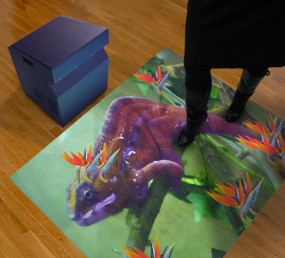
GestureTek’s Motion-Based Digital Signage
Join the Party at No Charge
Do you need to reach the POS & Auto ID resellers who really drive business—in the most targeted editorial environment, and on the most cost-effective basis?
E-mail Michael
Kachmar for advertising information,
or call 973-270-3284
Did you miss one of our issues and suddenly realize your competitors know more than you do?
Hurry ! Use the links below to catch up :
INTEGRATION
Dinerware Feasts on Virtual Client
Dinerware, Inc. (Seattle), one of the leading hospitality POS providers, has outfitted its Version 2.8.2 with an XML-Based Virtual Client API and has announced three new certified partners. “The Virtual Client in Dinerware Version 2.8.2 enables third-party product integrations so restaurateurs can select specific functionalities for their businesses and future growth,” commented Jeff Riley, Dinerware CEO. “We are excited about our rapidly expanding portfolio of third-party certifications that extend deeper control and open up new revenue opportunities for our customers.”
First, Dinerware has certified TimeForge (Lubbock, TX), an automated labor management and employee scheduling system which allows workers to swap shifts, request time off, or view their time card through the Web. Next, Dinerware certified QSROnline (Corpus Christi, TX), the centralized, online inventory management and enterprise reporting system that includes accounting plug-ins such as QuickBooks and links major food players via QSROnline EDI. Last but not least, Dinerware certified DishCloud (Seattle), an online ordering and self-service solution for restaurant customers.
“Peli Peli deployed several technologies that integrated with Dinerware,” testified restaurant-owner Paul Friedman of Houston. “The system itself is rock-solid, but the ability to select a variety of products that easily connect with Dinerware has given us powerful insights and control over our business health and future growth.”

Jeff Riley, Dinerware CEO
[Editor’s Note: Posera (Seattle), another hospitality POS provider, has integrated its Maitre’D solution with the eSysco online ordering portal of North America’s leading foodservice marketer and distributor, Sysco. “Maitre’D and its recommended hardware providers--Touch Dynamic, PartnerTech, Sharp, Epson, and ONEAC--are proud to offer products and services to Sysco’s customer base at special pricing and consideration,” stated the ISV in making its announcement.]
All the Bandwidth You Need (and No More)KORE Telematics (Reston, VA), the digital wireless service provider specializing in machine-to-machine (M2M) communications, has debuted “Ultra Low-Use” wireless services for North America. The family of offerings provides GSM or CDMA network usage across all customer M2M devices at a low monthly cost, hopefully opening up new market opportunities for application providers. Such target markets include industrial monitoring and control, asset tracking and tagging, auto leasing and service, residential alarm and security, and remote vending management.
“Some of the most valuable M2M applications do not require large amounts of network airtime,” explained Alex Brisbourne, President/COO at KORE Telematics. “As a result, many usage plans have monthly minimums that exceed the airtime used, and these costs can blur an application’s value. In order to help our partners and customers fully realize this value, we have leveraged our buying power with Tier 1 carriers to deliver extremely cost-sensitive services for these low-use M2M applications, yet with all of the benefits of great coverage, reliability, and our automated PRISM management tools.”
The new KORE program aims to replace outdated and bandwidth-capped services such as paging and proprietary signaling devices with state-of-the-art SMS and IP-based connections, without the expected rise in cost, according to the company. It was also designed for seamless upgrades to higher-use wireless services. Lastly, it features the tailored “burst” option to allow for occasional periods of heavy use, such as during system upgrade across the customer’s entire network of devices.

Alex Brisbourne, President/COO, KORE Telematics
Code
Corner
Cutting Edge Solutions (Butler, PA), the company that develops and markets Future POS software, has unveiled Future POS 5.0, which includes added functionality such as back-office dashboards and customizable “favorites” pages. In addition, the developer has moved from an older and less robust database to Microsoft SQL, facilitating integration with third-party applications and outside developers. The dashboards and favorites features were added to allow POS users to access key information quickly and easily depending on their needs. For example, members of the wait staff can click view their favorites pages to see closing procedures, payroll information, or daily menu items. Managers and owners can utilize the dashboards and favorites pages to review restaurant performance in real time, such as top-selling items and sales figures for the day. But the biggest change for Future POS 5.0 is the move to Microsoft SQL, according to John Giles, President and Lead Developer at Cutting Edge Solutions. “Previously, you had to decide between using a product that had lots of features but ran on a proprietary database, or a product that uses Microsoft SQL but has limited functionality,” Giles asserted. “With the release of Future POS 5.0, restaurateurs will finally have the best of both worlds.” He promised further advancements to the package in the future.
INSTALLATIONS
Retail 2.0, from Activant and CompUSA
CompUSA has selected Activant Eagle software from Activant Solutions (Livermore, CA) as its business management and POS platform for the much-heralded Retail 2.0 initiative. CompUSA introduced Retail 2.0, RRN.Com readers will recall, following its bankruptcy and purchase by Systemax Inc. several years ago. (Systemax also owns TigerDirect.) Born of necessity, the new concept sought to revive the brand through remodeled stores, aggressive pricing, and most significantly, open access to the Web for consumers. “Merging the best of the online experience with bricks and mortar shopping,” as described by the consumer electronics retailer.
CompUSA has reported tremendous success to date with Retail 2.0, and the addition of Activant’s software to manage CompUSA’s retail transactions and customer experience will be critical going forward, according to the two parties. With Retail 2.0, customers can research products, prices, and availability on hundreds of Internet-enabled screens throughout each of CompUSA’s two dozen stores. Further, customers can comparison shop right from the store to make sure they’re getting the best deal possible.
“In order for us to change the way people shop for consumer electronics, technology, and computer services with our revolutionary Retail 2.0 concept, it was important for us to have the right technology partner,” maintained Terry Perrin, President of CompUSA. “Right out of the box, the Activant Eagle solution is a complete retail solution capable of performing everything from the basic retail functions to our most complicated processes. Activant’s large network of support professionals was also an important factor for us as we continue to grow and open stores across the U.S.”
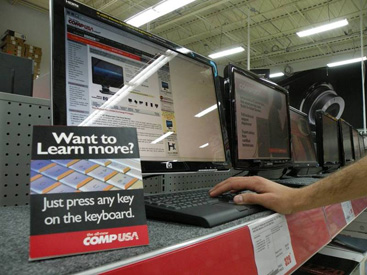
Open Access to the Web for Store Customers
Home Hardware Stocks Up on Intermec CK3
Home Hardware Stores Limited, Canada’s largest independent hardware, lumber, building materials, and furniture retailer, has selected Intermec’s CK3 mobile computer for use across its 1,000 locations. The sale went through Intermec Honours Partner, Ryzex (Bellingham, WA), and followed evaluation of the CK3 by Home Hardware’s employees, help desk, and management. The CK3 will be used to help manage the retailer’s more than 60,000 items and also to extend its in-store POS capabilities. Home Hardware expects improvements in inventory management, store ordering, and pricing and promotions.
“We’ve been working with Ryzex for a few years, and they appreciate the challenges involved with running a retail operation,” reported Keith Hunt, Director of Retail Application for Home Hardware. “We selected the Intermec CK3 because of its broad feature set and overall weight and economics, enabling our dealers to streamline operations by utilizing highly adaptable data and image-capture capabilities, along with secure wireless communications, in its highly durable handheld package. Positive feedback from our dealers was also very influential in the selection of the Intermec solution.”
“Our relationship with Home Hardware has enabled us to truly understand their operations and provide quality counsel regarding the leading AIDC solutions that will empower them to efficiently manage their inventory,” added Ken Rayner, GM, Ryzex Canada. “We recommended the Intermec CK3 because it was the best solution in the industry for meeting their business needs and seamlessly integrating with their current software and systems.”
Key
Advertiser
Links
Be sure to visit these vendors for the latest in channel products and offers for resellers.
POS & Auto ID Distribution
BlueStar
M-S Cash Drawer
POS & Peripherals
Aures Technologies
FEC USA
POS-X
Touch Dynamic
Barcode & Mobile Printers
Datamax-O'Neil
Cash Drawers
MMF Cash Drawer
Data Collection Software
Wavelink
Data Collection Terminals
CipherLab
Datalogic
Mobile
Janam Technologies
Motorola
Integrated Payment Solutions
Datacap Systems
Payment Engine Solutions
Precidia Technologies
Receipt
Printers
Citizen Systems America
Star Micronics
Retail Software
Toshiba TEC
Screen Protection
3M Optical Filters
Thermal Printers
Seiko Instruments USA
Video Surveillance & Access Control
ScanSource Security
HELLO GOODBYE
Posiflex Hires VP of Channel Sales
Posiflex Business Machines (Hayward, CA) announced that Doyle Ledford has joined its executive team as VP of Channel Sales. Previously, Ledford served as Director, Panasonic Information Systems, where he was responsible for the POS effort, including most recently, the introduction of Panasonic’s new Stingray POS Workstation.
Steve Young, CEO of Posiflex, said: “We are delighted that Doyle is coming onboard. He will work closely with Executive VP, Tim Becerra, to ensure that our partnerships with Distributors, Independent Software Vendors, and Value-Added Resellers continue to grow and serve the expanding and evolving POS market.”
“We are excited for Doyle to join the Posiflex team,” Becerra agreed. “Doyle has a strong background in channel sales and service from his 16 years at Panasonic and adding his talents to our team will enhance our ability to help our distribution and channel partners expand into new vertical markets.”
VP of Service Providers Enlisted by Westcon
Westcon Group (Tarrytown, NY), the specialty distributor of networking, convergence, security, and mobility, has appointed Gahn Lane to VP, Service Providers, the Americas. The service provider market represents an important growth segment, said Westcon Group in making the announcement, especially as customers look to conduct more global business. Last year, Westcon Group completed over 20,000 multi-national transactions in more than 60 countries, helping service providers cope with compliance, tax, and logistics issues.
Lane brings 20 years of channel sales experience to the position. Previously, he held senior executive roles at Nortel, where he oversaw the development of the company’s service provider accounts such as AT&T and Sprint. Lane also managed sales of Nortel’s VoIP and data portfolio and its managed services offerings. He will report to Anthony Daley, EVP, Westcon Group.
“Our service providers vary in profile and size, but each of them needs to focus on increasing their international deployment capabilities to sustain growth over the next decade,” Lane suggested. “Westcon has the product portfolio and logistical scope to help them scale this challenge quickly, and to help them realize the potential of international sales faster.”

Gahn Lane, VP, Service Providers, the Americas, Westcon Group
Channel Factoid
AMR Research has found that the risk of sourcing and manufacturing in China is increasing rapidly as the result of intellectual property infringement, quality failures, and regulatory compliance (or the lack thereof). China contributes the most risk in 12 out of 15 categories identified in AMR’s most recent quarterly report of U.S.-based manufacturers and retailers. Respondents cite China as contributing the most to intellectual property infringement (59%), product quality failure (55%), and regulatory compliance problems (34%). Last quarter, China contributed the most risk in 10 out of the 15 categories. “Concerns with China’s product quality and safety record continue to rise from quarter to quarter,” noted Noha Tohamy, VP of Research for AMR and author of the report. “This will ultimately limit China’s play in high value, labor-intensive manufacturing outsourcing.” As one result, companies are continuing to look near-shore for sourcing and manufacturing, with three times as many respondents planning to increase activity in this area versus decrease.
MARKET WATCH
Taking the Read of the Credit Card Act
Much has been written on the impact to consumers of the new Credit Card Accountability Responsibility and Disclosure Act, recently signed into law by President Obama. RRN.Com wondered about the new law’s effect on the POS reseller channel, and recently spoke with Terry Zeigler, CEO/President of Datacap (Chalfont, PA), about possible unintended consequences. Zeigler’s observations appear below.
One: “Since the card-issuing banks will need to make up the lost revenues somehow and can’t put it solely on the consumer, that will likely mean increased card acceptance cost to the merchants. Merchants are already paying higher interchange fees and covering the costs of reward programs and corporate card acceptance. Those types of costs are likely to increase.”
Two: “If merchants are paying higher card acceptance costs, they may try to induce customers to pay with cash, reducing the transaction fees that support the ISOs and many POS dealers. There could also be backlash in terms of not wanting to buy or pay for new payment platforms, causing reduced sales opportunities for these providers.”
Three: “Many new merchants, as well as new POS dealers and ISOs, start-up their businesses using credit cards. These new rules will result in tougher credit requirements, making it more difficult for both types of businesses to get those cards. This could mean more unfunded businesses and unpaid bills.”
Four: “ISOs will be under pressure to reduce their margins and maintain their customer base, resulting in ever-tougher battles for good accounts. This could even pit ISOs against POS dealers, instead of creating synergistic sales and support relationships.”
Positive possibilities of the Credit Card Act include shifts to more effective payment technologies, such as Flexible Spending Account (FSA) cards, as well as the “dramatic” rise of rental programs and Software-as-a-Service (SaaS), Zeigler told RRN.Com. One last note in this area: It is important to differentiate between personal cards and corporate cards when assessing impact. Provisions of the new law do not apply to corporate cards, meaning those covered under limited liability, even if used by small businesses.
Terry Zeigler, CEO/President, Datacap Systems
PinPoint Media
All Rights Reserved


